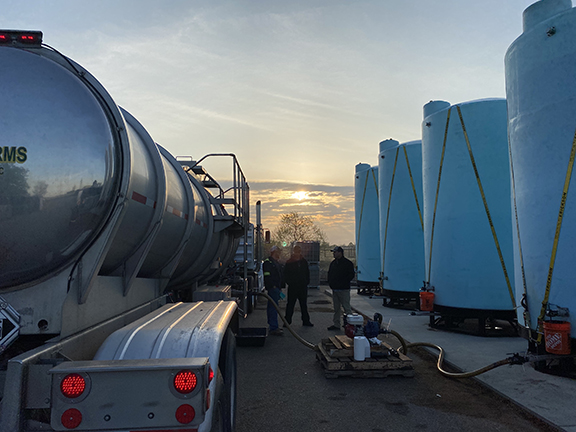Utilizing a high-tech process involving thermal decomposition, Merced, Calif.-based Corigin Solutions LLC is turning crop waste into a biochemical plant growth enhancer that is proving to increase yields, reduce costs and sequester carbon.
“It is the epitome of a circular economy,” said Founder and CEO Michael Woelk.
He noted that the company is an investor-backed startup currently producing its liquid product on a pilot scale of one-half ton per hour. “As we scale our operation, we will produce 12 times that volume,” he said.
Woelk said the company officially began making product in April 2021, which is about when the firm became a resident of the Western Growers Center for Innovation & Technology, but the concept predates that by several years. He explained that it began with many conversations about how to turn biochar into viable agricultural products that help farmers and help the environment. Biochar is the lightweight black residue, made of carbon and ashes, that remains after the pyrolysis (thermal decomposition) of biomass. It is essentially a byproduct of crop waste that can improve water quality, reduce soil emissions of greenhouse gases, reduce nutrient leaching, reduce soil acidity, and reduce irrigation and fertilizer requirements. Biochar is noted for remaining in the soil for literally centuries, improving soil fertility for generations to come, while sequestering carbon.
Corigin’s top executive said the company has been trialing its product on both permanent crops and vegetable crops “with no negative results.” He said it has an amazing track record revitalizing tired orchards and vineyards that appear to be headed for replanting. The cure, according to Woelk, is typically 2-3 gallons per acre of Corigin’s proprietary Coriphol, sold at $40 per gallon. Depending upon the crop, a gallon of Coriphol is typically applied pre-planting for row crops and before bloom on permanent crops. The trials have also shown that for permanent crops applying another gallon post-harvest has shown to be very beneficial.
Woelk said the product offers the promise of both reducing costs through less use of inputs and increasing revenues through higher yields. He understands the skepticism of farmers who have constantly been presented with the next foolproof solution to their problems…“the next bug in the jug” as he calls it. But Woelk said virtually every grower that has trialed Coriphol has been “blown away” by its performance.
He said utilizing this product allows growers to focus on “crop wellness instead of just treating problems.”
The company’s website defines Coriphol as “an aqueous solution comprised of numerous phenols, organic acids and other light weight biomolecules sourced from almond shells.”
That website also articulates, in a very detailed way, the process of turning crop waste into this biochar product. “The principles of Corigin’s production platform are based on thermal decomposition (pyrolysis) of lignocellulose and vapor handling. Pyrolysis occurs naturally in wildfires. Our technology reproduces this same pyrolytic process in a controlled environment, more efficiently and on an industrial scale. Under high temperature and oxygen-free conditions, lignocellulose converts into vapors, gases and biochar. By limiting oxygen availability, we prevent the combustion of the vapors and instead condense them as bio-distillates comprised of hundreds of low molecular weight biomolecules, namely plant phenols and organic acids. We also collect a high quality biochar.”
The website reveals that Corigin’s technology partner is Pyrovac, Inc. The Pyrovac platform is comprised of a state-of-the-art biomass reactor and other high-tech equipment that ultimately creates the end product in a way that “produces no waste or harmful emissions and is carbon negative.”
On its website, Corigin defines its value proposition in many different ways but being good for the environment is a common thread. “Corigin’s products can help rebalance the carbon cycle by permanently sequestering carbon in soils, where again, carbon does miraculous things to improve farmland fertility. Our biochars also reduce farmland runoff and emissions by retaining nutrients in soils and reducing load requirements. Biochar also adsorbs about five times its weight in water—a huge benefit in drought-stricken regions like California.”
Woelk said it is a profitable business model as the company is converting low-cost raw materials into a valuable product. He reports that about 80 percent of the crop waste on a farm is low-value residue like nutshells and orchard trimmings. “Now, imagine a technology that continuously converts low-cost biomass into multiple high-value revenue streams continuously—at 80 percent product yield,” claims the website noting that every ton of crop waste produces about 1600 lbs. of product. “Corigin’s process offers a way to recover more value per ton of plant waste than perhaps any other process in the world,” he said.
Corigin is working directly with growers on crop trials and Woelk encouraged interested growers to get in touch with him directly at (949) 677-6230, [email protected] or www.corigin.co, or through WGCIT. The company’s product is currently on the market in several options and being sold by Penny Newman Farm Products.




